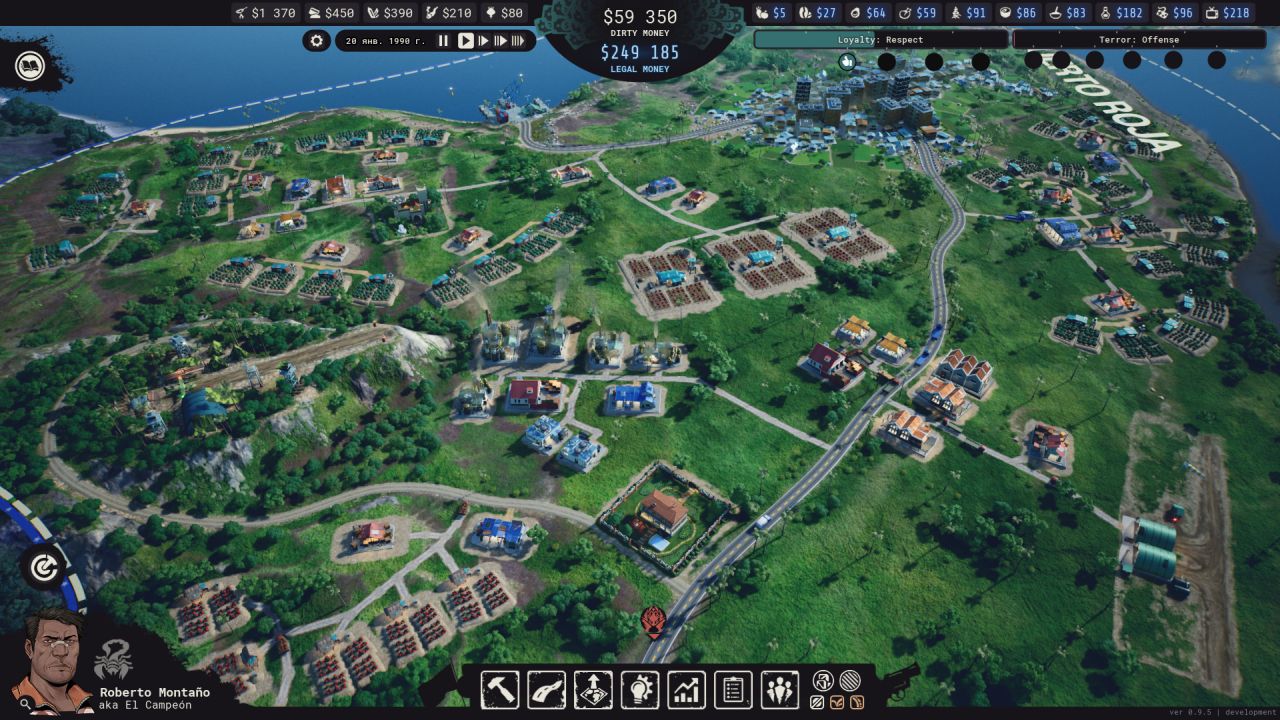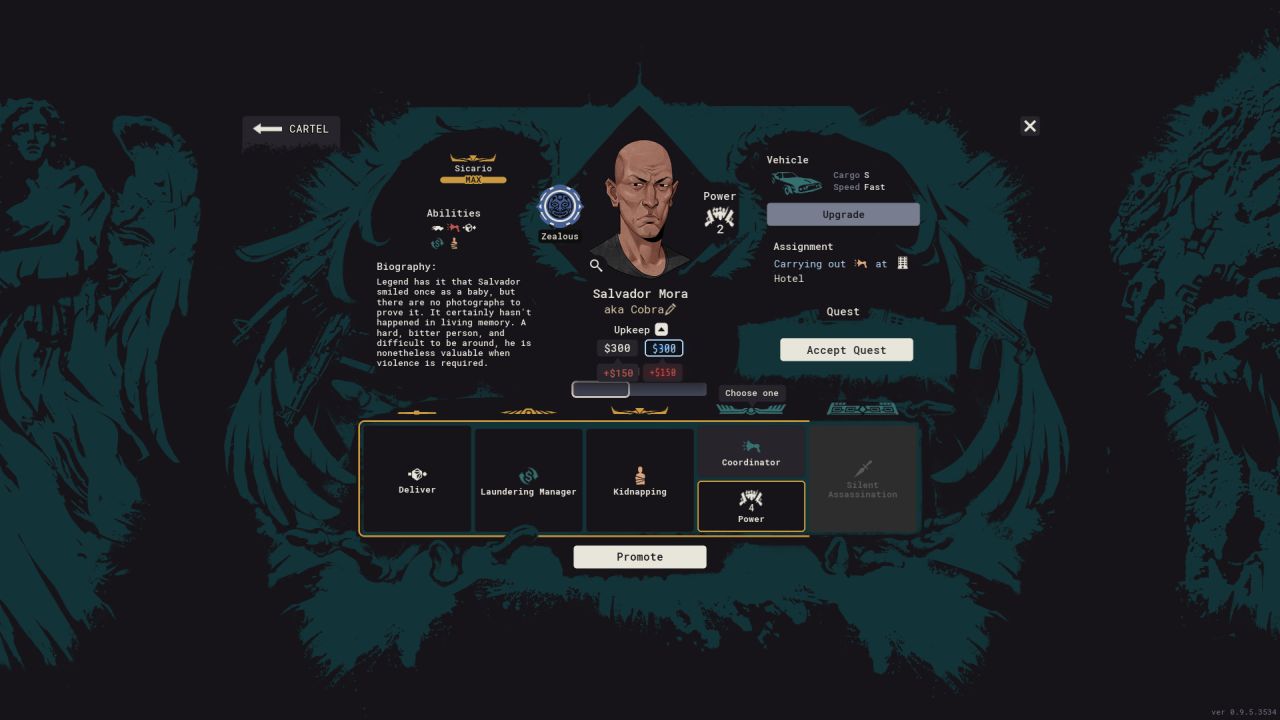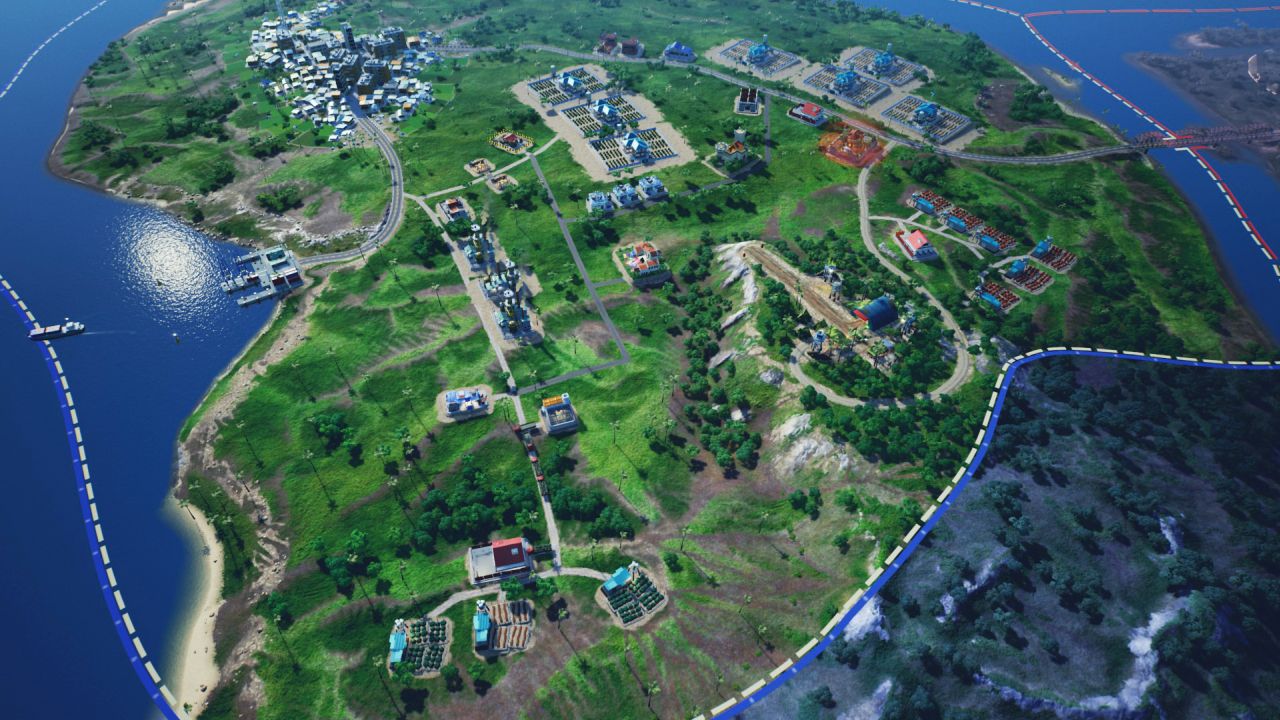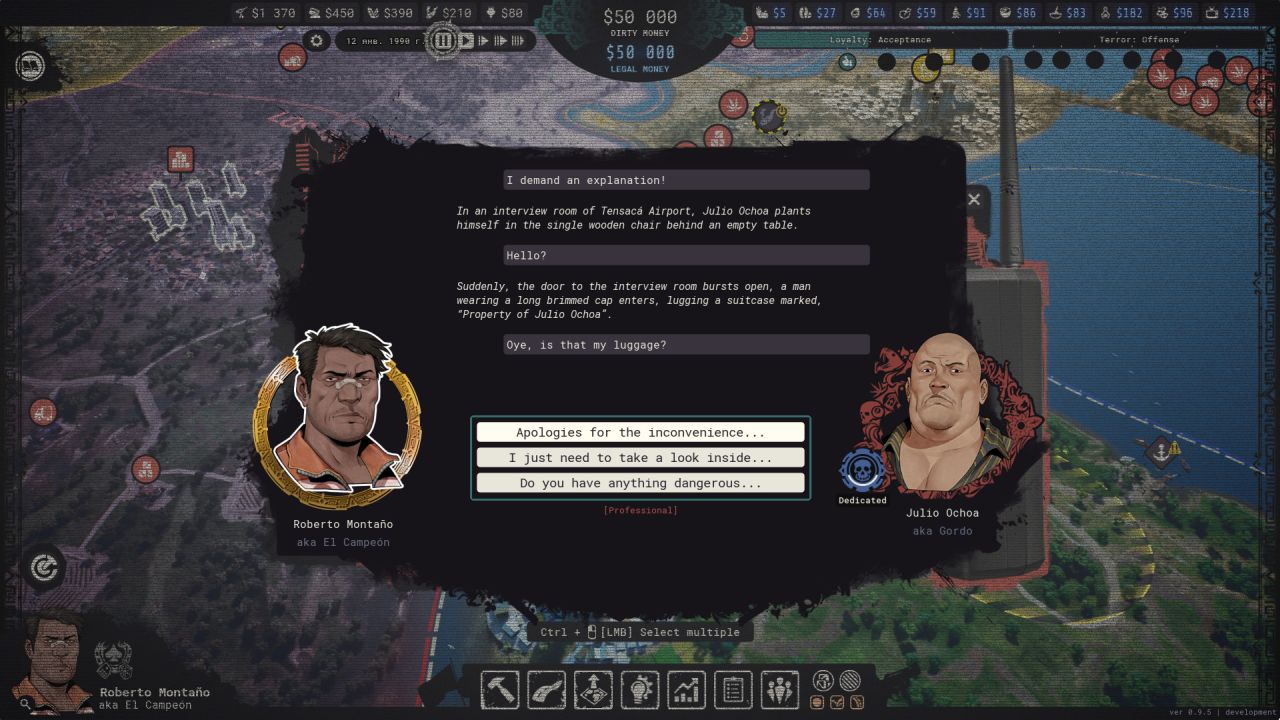Cartel Tycoon Review
A limited management game about the drug trafficking world
Operating the drug trade is an illegal and dangerous business, but this makes it an enticing subject for many forms of media. Video games have recently been jumping on this bandwagon, with everything from Weed Farmer and Drug Dealer simulators to more sophisticated efforts such as Weedcraft Inc. Cartel Tycoon is the latest entry to tackle the setting, offering players a chance to create and oversee a drug manufacturing empire in this business strategy game.

Cartel Tycoon takes place in the 1980s, when the drug trade was flourishing in Latin America. Players assume control of a Capo, the latest "entrepreneur" hoping to make it big. From a small piece of land, you eventually hope to grow your production and your territories. The solo campaign mode offers three stories to play through, although the first is just a tutorial. In the tutorial, you are a young man and the son of an existing powerful drug lord, trying to make your way into the business with the help of one of the lieutenants. The tutorial goes over the basics of this strategy game, although it is not as extensive as it could have been. It explains a few of the structures that you can build, but then it sort of just ends without tackling every aspect or the more in-depth mechanics found in the late-game.
You can keep playing the tutorial map and learn on your own, or jump into one of the two story campaigns available at launch. The first story promises a medium level of challenge, while the second campaign is harder. It's nice that the developers attempted to inject some sort of a narrative into the experience, and you'll meet a number of characters and observe some scripted events along the way. There's some conversation text to read, and even a couple of cutscenes – though it mostly serves as window dressing. Disappointingly, while the tutorial features voice acting, the actual story campaigns do not. Beyond the campaigns that take about 10 hours total to beat, you can also jump into a hardcore Survival mode, or a freeform Sandbox mode with customizable settings.
The core of the experience lies in building and operating a drug production industry. Like most games of this type, you can freely zoom and rotate the camera over the lush green terrain, and start placing structures. Unlike most games though, this tycoon has very few buildings available. There is just one farm, one transport depot, one warehouse, and a few other structures to place. Sure, some buildings have different modes (such as farms able to choose between different yields), but on the whole it's not an overly complex experience. So what ends up happening is you find what layout and design works best and most efficiently, and when new territories are unlocked you just start rebuilding in the same manner.
Placing structures is easy enough, but you must also ensure they are connected via roads. Roads are a bit of an annoyance in Cartel Tycoon, seemingly by design. Placing roads is very freeform, and you can attach to any side or corner of the building and connect it to another road. The problem is that all AI vehicles that transport the goods cannot pass "through" buildings. That means you cannot have a hub-and-spokes type design, you have to place additional roads so that each structure is connected to a main feeder road. This design leads to a lot of wasted space and a spam of side roads. The only exceptions to this are lieutenants units, as they can pass through buildings. Further, there's a small bug, when you delete a building its small notch entry road that connected it does not get deleted and can't be removed.

The campaign structure itself follows the narrative elements that happen at certain points, and a series of linear chain quests that guide you through building up and expanding. You start off with a piece of land on the fictional nation, and the rest of the map is carved up into territories. To claim a territory, you may need to fight off rival gangs, as well as complete a quest chain for the mayor of the local city, after that the territory becomes yours to build on.
A lot of the structures operate in two ways – they automatically interact with everything in their radius, as well as have an option to manually designate a target. For example, storage depots automatically grab the yields from nearby farms. You can then use a transport company that will pick up the goods from warehouses in its local area, and can be manually pointed to have a destination at the airport/sea port. After all, the whole idea here is to grow and export the drugs, not store them. You can eventually build your own airports to create these smuggling points on the map, but you will also often utilize the pre-existing sea ports and airports to conduct the sales.
There's a variety of goods in the game – you start off growing opium and can work your way into other drugs such as cannabis and heroin. The prices of the goods are displayed and randomly generated, so some days you can make more or less money from an export. You can also trade with locals, or grow your own, non-illegal goods such as vegetables. Cleverly, the game even has a building where you can package drugs into vegetables in order to apparently hide them. But interesting ideas such as this go underutilized – it doesn’t seem any better to straight up export drugs vs. trying to hide them. If you have a warehouse full of vegetables (legal ones, without a special payload), the cops will be just as suspicious. In fact, you could just become a legal vegetable farmer, which offers flexibility but also seems a bit silly.
To get the business off the ground, the main resource is money – and there are two types: legal (laundered) and illegal. Illegal funds can be used to construct most buildings, and legal money can instantly complete any structure in progress if you wish. Money is also used on the research tree, where you can pay to improve the utility and effectiveness of the various building types. To get legal funds, you can interact with cities on the map, where a limited number of structures can be placed, from churches to taxi companies, which launder your money over time. Villas are the building that manages your finances, and again it will automatically fund the upkeep of anything in its local area, and you can manually designate more distant locations where cash flow needs to happen.
Villas are also where you can hire lieutenants, the only units in the game you can manually control. These folks are hardcore criminals and will do whatever is asked – as long as you keep giving them raises so that their loyalty remains strong. You can ask them to do things like assassinate another lieutenant, manually deliver goods and money between remote locations, and so on. They can also be instructed to attack buildings owned by a rival gang – which simply means waiting for your side to win, assuming your firepower strength number is higher than the defenders. Constantly having to keep an eye on these units and manually moving them around the map can get cumbersome – as does a few other aspects of the game.

It may seem like once you've got some farms, roads, transport and exports flowing, all supplied by a villa or two, you can leave Cartel Tycoon to its own devices. However, that is not the case, and there is actually a significant amount of micromanagement that needs to happen. There is a constant balancing act of laundering funds in order to keep your empire operating – buildings start to shut down if their upkeep isn't paid, which can snowball quickly. You can toggle the upkeep from legal to illegal money, which can give you a temporary lifeline. You must also keep an eye on two meters – loyalty of the local people, and their terror. These two meters guide a lot of your actions and can again have snowballing consequences that are difficult to recover from.
Keeping the local populace loyal is a way to keep yourself alive and avoid a revolution. You can visit cities on the map and interact with the mayors, ensuring they are "on the same page" with your operations. As mentioned, structures can be built, such as churches and casinos, where you can spend money in order to give the ratings a boost. You can ask mayors for favors to help manage the two meters, and it all comes at a monetary cost. The conversations with mayors are scripted and the text sadly repeats for pretty much every city.
Keeping the terror levels low is also very important. The meter rises as you expand territory and fight rival gangs, or even just when your warehouses and buildings are full of "goods" waiting for export, which attracts the attention of law enforcement. As terror increases, the cops will be on you quickly, blocking off major roads which seriously disrupts your transport paths, as well as outright shutting down your buildings, which you have to buy out after a certain amount of time has passed. Just like the potential collapse of your economy from not having enough cash on hand, letting the terror meter slip too far leads to a snowball effect of problems that can be too difficult to recover from in the campaign.
So while things can get dicey, at least you can enjoy the game's colorful aesthetic. The 1980's style is decently recreated, and you can zoom in all the way to near-ground level to observe your business operations. The colorful terrain and bustle of the ground, sea, and air transport gives the map a decently lively feel. The art style isn’t particularly original, but it's of decently high quality, as is the UI design. The light background music fits the setting, with Latin beats. The game also runs without any technical issues, though there was an occasional gameplay bug or two.

Cartel Tycoon is a fairly well designed production management game, with decent mechanics and presentation. The core gameplay is fairly predictable and if you can stomach the micromanagement, this may be a solid option. However, there's not a ton of variety or depth here, and while the drug trade makes for a somewhat unique premise, the game doesn't take full advantage of it. Replacing the drugs with something else (which, in fact, you could do) doesn't change a whole lot – and so you might as well be playing Tropico instead, which is arguably a more expansive and entertaining game - though this title does come in at a lower price point.
 Comments
Comments











